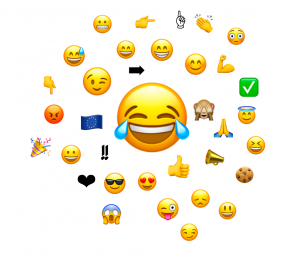Research Topics
Our group focuses on computational linguistic analyses of digital media. Particular research topics of interest are:
- harmful language online, such as disinformation and hate speech
- discourse and dialog structure
- machine learning approaches to social media discourse
- computational analysis of non-literal meaning
- linguistic variability in digital media
- emojis and other linguistic social media phenomena
- computational approaches to QUDs
Research Output
Current Funded Projects
Semantics and pragmatics of emojis in digital communication
- DFG Priority Programme "Visual Communication" ViCom; DFG, 2022-2025
- PIs: Tatjana Scheffler, Patrick Grosz (Oslo)
- project website
In this project, we investigate the explanatory power of iconic and symbolic approaches to emoji semantics via corpus analysis and a set of experiments that explores the continuum between pictorial and symbolic emojis. Starting from the hypothesis that face emojis are composed of (iconic or symbolic) minimal units, we study how existing and novel emojis are processed semantically. This empirical basis will allow us to differentiate between the proposed iconic and lexical approaches to emoji meaning and develop a hybrid semantics.
Virtual Common Ground: Language and Virtual Identity
- SFB1567, subproject D03; DFG, 2022-2026
- PI: Tatjana Scheffler
- project website
The subproject investigates the question of which linguistic means are used to construct and maintain the Common Ground in virtual communication. Using corpus and computational linguistic as well as experimental methods, two primary phenomena are investigated: the indication of group membership through positive speech (the counterpoint to hate speech), and the construction of virtual identities via linguistic self-representation, as well as via the adaptation to interlocutors in virtual life worlds.
Metaphor and social positioning in religious online forums
- SFB1475, subproject C04; DFG, 2022-2025
- PIs: Tatjana Scheffler, Frederik Elwert (RUB CERES)
- project website
„Metapher und soziale Positionierung in religiösen Online-Foren“. Das Projekt erforscht, inwiefern Metaphern sozialer Rollen in den Äußerungen von religiösen Laien in Online-Foren verwendet werden. Inhaltlich steht der Einsatz von Metaphern zur Abgrenzung verschiedener Gruppen im Fokus. Auf methodischer Seite erforscht das Projekt computerlinguistische Methoden, die die Diskursstruktur der Foren nutzen, um Metaphern in großen Datenmengen teilautomatisch finden und interpretieren zu können.
noFake: Crowdworking, digital platforms, social media
- BMBF, 2021-2024
- PIs: Dorothea Kolossa (RUB EIT), Tatjana Scheffler, Tobias Gostomzyk (TUD Jura), CORRECTIV gGmbH
Unser Ziel ist es, ein KI-basiertes Assistenzsystem zu entwickeln, das große Datenmengen sichtet, verdächtiges Text- und Bildmaterial vorsortiert, Bezüge zu ähnlichen Materialien herausstellt und Quellen und Verbreitungswege von Nachrichten für Fact-Checker:innen kontextualisiert. Der Nutzen eines solchen Assistenzsystems ist mehrschichtig. Zum einen können journalistisch ausgebildete Fact-Checker:innen nicht nur jeweils einen einzigen Fall, sondern gleichzeitig eine Vielzahl ähnlich gelagerter Fälle effizient bearbeiten. Zum anderen gestalten wir hieraus eine Plattform zur breiteren Einbindung von Bürger:innen in die kritische Auseinandersetzung mit Misinformation, Desinformation und Hetze, indem ein transparenter Zugang zu den technischen Systemen des Fact-Checking geschaffen wird.
Transforming text across media
- SFB1287 (U Potsdam), subproject T01; DFG, 2021-2025
- PIs: Manfred Stede (U Potsdam), Tatjana Scheffler
- project website
In Kooperation mit zwei Sprachtechnologieunternehmen (Acrolinx und Retresco) beschäftigt sich das Projekt mit der Aufgabe, Texte an die Konventionen und Anforderungen verschiedener Zielmedien, insbesondere schriftlicher Blogs und Microblogs (Twitter) sowie gesprochener Podcasts, anzupassen. Der Fokus liegt dabei auf den Phänomenen der Diskursebene: Koreferenz, Partikelverwendung und Kohärenzbeziehungen. Variationen in diesen Dimensionen werden in Lese-/Hör-Experimenten mit der menschlichen Verarbeitungsleistung korreliert. Die Erkenntnisse werden anschließend in Modelle und Algorithmen zur Identifikation von zu adaptierenden Textpassagen überführt und Experimente zur automatisierten Umsetzung dieser Adaptionen durchgeführt.
Lehrprojekt: Digitale Analyse großer Textkorpora
- RUB "Forschendes Lernen", 2021-2022
- Projektwebseite
Lehrprojekt: LIMELDAS
- RUB "Forschendes Lernen", 2020-2021
- Methodische Ausbildung: Empirisches Arbeiten mit linguistischen Daten
Recently Completed Projects
- SFB1287, subproject A03 "Discourse Strategies across Social Media: Variability in Individuals, Groups, and Channels"; DFG, 2017-2021
Resources
Linguistics of Emojis
We maintain the public Zotero library on papers related to the linguistic analysis of emojis. You can view or use the library here.
If any references are missing, you can suggest additions to the library via this online form.

